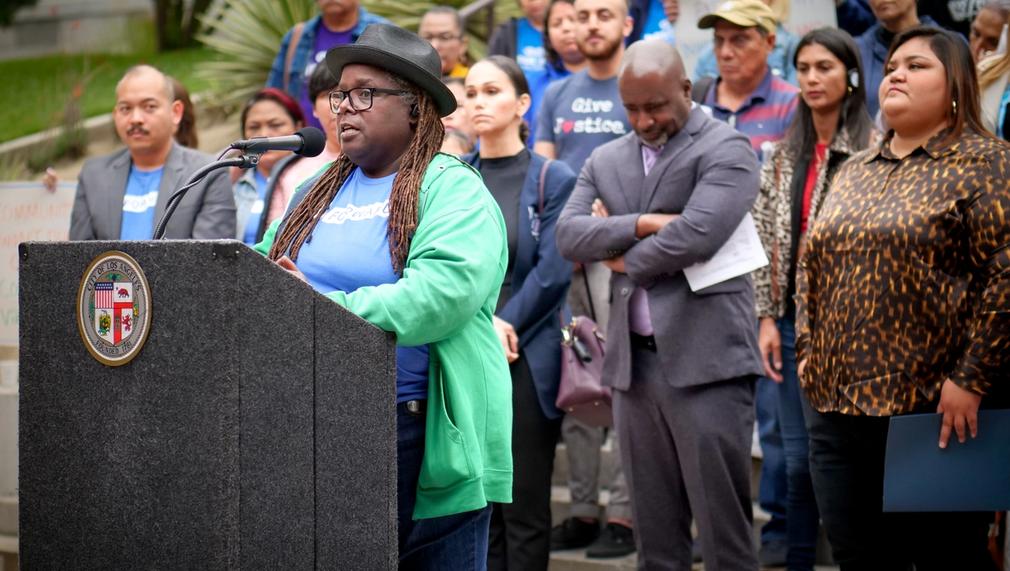Effective and Compassionate Crisis Response for LA County
LA Forward Institute is working to leverage multiple strategies to transform the insufficient crisis-response system in LA City and LA County so that all people, especially those experiencing acute mental health distress and homelessness, will benefit from easy-to-access, trauma-informed, and coordinated 24/7 care that minimizes violence and maximizes compassion.

What is the primary issue area that your application will impact?
Community safety
In what stage of innovation is this project, program, or initiative?
Expand existing project, program, or initiative (expanding and continuing ongoing, successful work)
What is your understanding of the issue that you are seeking to address?
According to a 2023 Los Angeles Police Department use-of-force report, of the 34 people shot by police, 13 instances involved individuals experiencing homelessness and 12 included people having a mental health crisis – a 12% increase over 2022. Data shows that the vast majority of civilian-initiated 911 calls in LA City are not related to violence or crimes, yet all 911 calls are currently routed by default to operators under the police department. This has led to people who are homeless and/or in crisis increasingly becoming the victims of police violence. Meanwhile, cities like Denver and Eugene, OR are piloting citywide programs to send paramedics and mental health professionals, instead of law enforcement, to many nonviolent 911 calls. As a city struggling with so many challenges, we must evolve our current emergency management systems to include a 24/7, coordinated, comprehensive, care-based, and region-wide response infrastructure to assist people experiencing acute distress.
Describe the project, program, or initiative this grant will support to address the issue.
At LA Forward Institute (LAFI), we are working with officials at the city, county, state, and federal level to educate the public and develop a comprehensive, coordinated, care-based, compassionate, and trauma-informed response to people experiencing crises in LA City and County. A grant from LA2050 will help support our plans for the coming year which include:
Ongoing education and advocacy efforts led by our 50-person “Unarmed Crisis Response Working Group,” which meets weekly to strategize and plan all upcoming work.
Specific opportunities to inform such as teach-ins tailored to the general public and individual meetings with people who are working directly with crisis-response policy and administration within local government. A comprehensive Crisis Response Summit that will be open to the public (including government officials, service providers, community organizations, impacted community members, etc.) and offer a platform for everyone to come together to discuss the current (inadequate) state of crisis response services, ask questions, and focus on a shared vision for the future.
A dedicated issue of LAFI’s popular Report Forward newsletter by journalist Alissa Walker, which has 10,000 readers, reporting on and recapping lessons from the Summit.
Planning for and potentially implementing a website that will serve as a one-stop shop for information on existing programs, services, and resources around crisis-response in the LA region.
Describe how Los Angeles County will be different if your work is successful.
We envision a future where all people in LA County are able to easily access compassionate, effective, and trauma-informed care when experiencing a crisis. The intended impact of this initiative is to change current systems so that our community employs coordinated services and resources to minimize the need for use of force and get people the help they need. As demonstrated by other successful pilot programs across the country, this drastic shift of approach will ultimately lead to lower crime rates, less violence and murders perpetrated by the police, increased community-wide mental health benefits, and a significant cost savings for taxpayers. Long-term scaling would involve building out LAFI’s efforts with a dedicated team and sufficient resources to continue our education and advocacy work. Additionally, we are working towards the creation of permanent community roles at the city and regional level devoted to sustaining a whole and well-functioning crisis-response system.
What evidence do you have that this project, program, or initiative is or will be successful, and how will you define and measure success?
Starting in 2022, LAFI began working on this issue in response to a wave of interest from community members who kept expressing their frustration that they didn’t know who to call when they saw someone in crisis. We’ve created a community-driven effort that weaves together policymakers and service providers in building an effective crisis response system for LA City and County. We’ve held meetings with 50 stakeholders. We’ve won the addition of $16 million to the LA City budget, introduced motions advocating for a centralizing dispatch of crisis response services and establishing mechanisms to measure long-term impact, and influenced LA City’s Office of Community Safety toward metrics of success in its most recent RFP for potential service providers. We’ve also surfaced 3,500 different federal grant opportunities, leveraging the capacity of our corps of volunteers to fill in gaps in government bureaucracies. Our work has been covered by ABC7, CBS Radio, and LAist.
Approximately how many people will be impacted by this project, program, or initiative?
Direct Impact: 15,000.0
Indirect Impact: 10,000,000.0